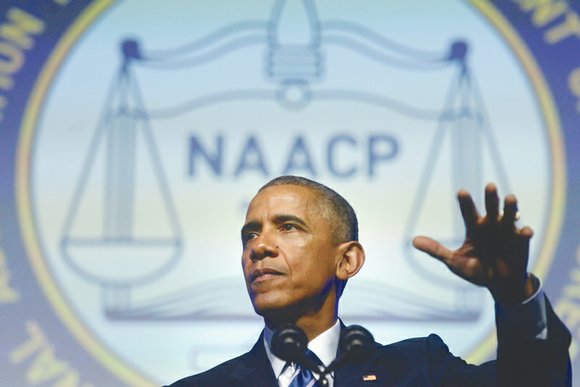President calls for criminal justice reforms at NAACP convention
Free Press staff, wire reports | 7/16/2015, 11:55 p.m.

“Mass incarceration makes our country worse off, and we need to do something about it,” President Obama told 3,000 cheering people at the 106th annual NAACP National Convention in Philadelphia this week.
Greeted with a standing ovation Tuesday by a delegation that included 161 adults and youths from the Virginia State Conference NAACP, the president called for Congress and others to work with him to put an end to harsh court sentences for nonviolent crimes, improve conditions in the nation’s jails and allow ex-offenders to vote.
He was critical of the mass incarceration that is tilted disproportionately against African-Americans and Latinos.
“Any system that allows us to turn a blind eye to hopelessness and despair — that’s not a justice system,” the president declared Tuesday at the Pennsylvania Convention Center. “That’s an injustice system.”
In his half-hour speech, President Obama said incarceration costs had surged to $80 billion a year as drug offenders were sentenced to harsher sentences. He said 2.2 million people are in prison, up from 500,000 in 1980.
“That is the real reason our prison population is so high. In far too many cases, the punishment simply does not fit the crime,” he said.
The Virginia NAACP contingent — including President Carmen Taylor, interim state Executive Director Jack Gravely and Richmond President Lynetta Thompson — attended the speech and applauded President Obama’s impassioned plea.
“I was ecstatic,” Ms. Thompson told the Free Press. “The president was very personal in his address and was right on point.
“He talked about not only what the government could do to address (the disparities in the criminal justice system), but what we in the community need to do,” she added.
“He said we need to invest more in our young people,” Ms. Thompson continued, “and families need to work together more closely to direct our children. He said we need to focus on our education system more than we do our criminal justice system.”
In late June, Rep. Robert C. “Bobby” Scott, a Democrat who represents Virginia’s 3rd Congressional District that includes Richmond, announced his effort with Republican Rep. F. James “Jim” Sensenbrenner Jr. of Wisconsin to introduce the Safe, Accountable, Fair and Effective Justice Act that would rein in federal spending on prisons and reform a system that is clogged by nonviolent offenders receiving long sentences.
The president, who on Monday commuted the sentences for 46 nonviolent drug offenders in federal prisons, has made criminal justice reform among his top priorities for his remaining 18 months as president.
His speech was filled with statistics and references to policy changes as he fastidiously made a case for why reform is necessary:
• An African-American man born 25 years ago has just a one in two chance of being employed today.
• One-third of the U.S. Justice Department budget is spent on incarceration costs.
He was cheered when he gave the crowd his definition of justice.
“Justice is living up to the common creed that says, ‘I am my brother’s keeper and my sister’s keeper,’” President Obama said.
“Justice is making sure every young person knows they are special and they are important and that their lives matter — not because they heard it in a hashtag, but because of the love they feel every single day — not just love from their parents, not just love from their neighborhood, but love from police, love from politicians.”
The president cited Kentucky Republican Sen. Rand Paul, running for his party’s 2016 presidential nomination, and Republican Sen. John Cornyn of Texas, as two lawmakers who agreed on the need for reforms.
The president — who planned to make history by becoming the first sitting president to visit a federal prison in Oklahoma on Thursday, July 16 — said the United States should reduce long mandatory minimum sentences for nonviolent drug crimes, or “get rid of them entirely.”
Prison conditions should be addressed to reduce overcrowding, gang activity and rape, he said. He added he had directed Attorney General Loretta Lynch to review the overuse of solitary confinement.
He also threw his support behind efforts to “ban the box” — a campaign to remove questions about criminal records from job applications. But he stopped short of pledging he would order federal agencies or contractors to take that step.
“The real question is whether this is the launch of a very serious effort to build redemption into our criminal justice system, or is this a campaign to burnish the president’s legacy,” said ACLU Executive Director Anthony Romero.






